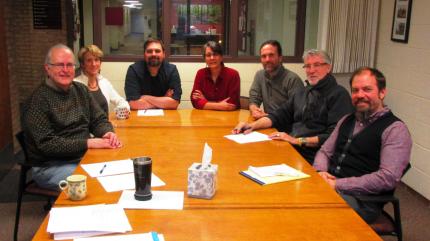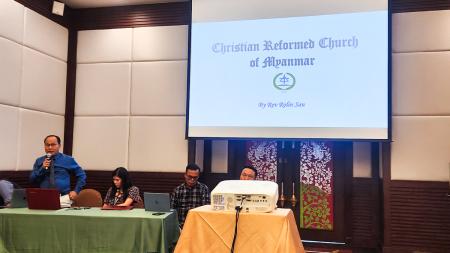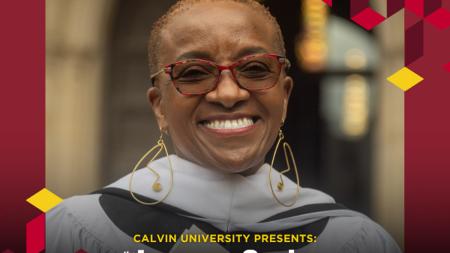Calvin Philosophers Reflect on Legacy of Change

Members of the Calvin College philosophy department
Chris Meehan
Carrying cups of coffee and laptops, members of the Calvin College philosophy department gathered around a long conference-room table on a recent afternoon.
It was their weekly business meeting, but today they had agreed to talk for a few minutes about a legacy of change in their department and specifically a January Series 2016 presentation that had taken place a few days before.
At the January Series, three former members of the department — Nicholas Wolterstorff, Alvin Plantinga, and Richard Mouw — took part in a presentation titled “The Renaissance of Christian Thought.”
Before they spoke, Calvin president Michael LeRoy had referred to them — and the fourth speaker, historian George Marsden — as the school’s “Beatles.”
They were academic superstars, said LeRoy, who played pivotal roles in helping to transform the college from an insular institution in the 1950s into the respected liberal arts school that it is today.
All four speakers were compelling, but I was especially intrigued by what the three philosophers had to say about how there was really no such academic discipline as Christian philosophy when they began teaching at Calvin in the 1960s.
Hoping to hear more about that and the legacy the three left behind when they had moved on to larger schools, I asked Ruth Groenhout, chair the department, to set up this meeting, which she opened by making a few comments.
She said Nicholas Wolterstorff especially pointed the way by showing that there was an audience for the work of Christian philosophers. Before he came to Calvin, philosophy departments tended to relegate issues related to God to theologians.
Wolterstorff, said Groenhout, helped to blaze a trail, breaking down academic barriers and making it so that those who followed didn’t need to justify their work.
“He helped to form a network and played a role in establishing the Society of Christian Philosophers. Now we can publish in journals that are hospitable to us,” she said.
When he came to Calvin as a student in the 1950s, said Wolterstorff at the January Series, Christian philosophy was not a recognized academic discipline. But the solid grounding in the Reformed faith that he gained at Calvin and then at graduate school gave him a hand in helping to change that situation.
“Back then, there was quite a bit of hostility to faith-based philosophy in this country,” said Matt Halteman, an associate philosophy professor.
Christian philosophy, which uses philosophical methods to
investigate and provide rational arguments for the Christian faith, has been popular in Europe for a long time, said Halteman.
But the approach never took hold in North America until philosophers such as Wolterstorff and Plantinga and Mouw joined with others at various schools in furthering the enterprise.
They showed that using the mind to approach questions about God and faith were topics that mainstream philosophers could tackle.
“They showed that Christian philosophers could demonstrate the viability of faith by showing its historical richness — as expressed by such thinkers as Augustine — and its intellectual sustainability,” said Halteman.
By doing a little homework, I found that Wolterstorff is well known for doing philosophy in Christian aesthetics, the branch of philosophy that deals with the principles of beauty and artistic taste. He was also a pioneer in the area of social justice.
Plantinga is best known for his work that justifies belief in God without external evidence. Reading his work can be challenging, but it is amazing to follow his reasoning that begins with certain givens and takes us to the doorstep of heaven.
Mouw has been a leader in ecumenical conversations and in showing how the Christian faith intersects with public life. He once wrote a short book offering his ruminations about being a Calvinist as he waited at a busy airport.
In talking to the current Calvin philosophers, I learned that they are also specializing in different areas, such as the philosophy of urban life, gender studies, medical ethics, education, the use of God’s resources, and business ethics.
James K. A. Smith specializes in worship and culture studies. He recently returned from a trip to Silicon Valley, where he goes every year to speak with visionary entrepreneurs about their ideas.
What Smith and the others especially appreciate about their department is that it has a rich history, going back before Wolterstorff to such teachers as Harry Jellema and Henry Stob, that it is open to creative, significant ideas from whatever quarter they come.
“There are [some groups] that want to circle the wagons and defeat the enemy,” said one of the philosophers.
But the philosophers at Calvin don’t do culture wars. Instead, they take wisdom from wherever they find it and place it, in the fashion of those who preceded them, into a Christian context, said another philosopher at the table.
(By this time, I was falling behind in making sure who said what as I took notes, so I simply tried to keep up with the comments.)
“We believe in common grace, which means we’re not scared to go to other traditions to learn about our own blind spots,” said someone at the table.
Another said that, as philosophers, they “reach beyond the pale and try to make the invisible visible, the unknown known.”
The group also said they are working in an academic department whose legacy prizes “asking questions so that we can model a deep voice of faith.”
One voice helped to summarize, speaking for perhaps everyone around the table, by saying that they believe that hard questions, especially about the place of evil in the world, are tough to answer.
But the hard questions must be asked.
After all, one said, if evil is part of the world, it must be addressed, in scholarship and the classroom, just as it is in the Psalms.
In the end, said another, they are following the footsteps of those who went before by “trying to give people the long view and the intellectual space in which they can search for and try to find the wisdom of God.”


